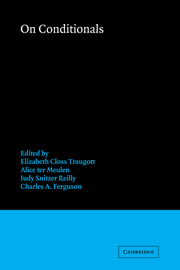Book contents
- Frontmatter
- Contents
- Contributors
- Preface
- Acknowledgments
- PART I GENERAL STUDIES
- PART II PARTICULAR STUDIES
- 5 ON THE INTERPRETATION OF ‘DONKEY’-SENTENCES
- 6 GENERIC INFORMATION, CONDITIONAL CONTEXTS AND CONSTRAINTS
- 7 DATA SEMANTICS AND THE PRAGMATICS OF INDICATIVE CONDITIONALS
- 8 REMARKS ON THE SEMANTICS AND PRAGMATICS OF CONDITIONALS
- 9 THE USE OF CONDITIONALS IN INDUCEMENTS AND DETERRENTS
- 10 CONDITIONALS AND SPEECH ACTS
- 11 CONSTRAINTS ON THE FORM AND MEANING OF THE PROTASIS
- 12 CONDITIONALS, CONCESSIVE CONDITIONALS AND CONCESSIVES: AREAS OF CONTRAST, OVERLAP AND NEUTRALIZATION
- 13 THE REALIS–IRREALIS CONTINUUM IN THE CLASSICAL GREEK CONDITIONAL
- 14 THE HISTORICAL DEVELOPMENT OF si-CLAUSES IN ROMANCE
- 15 FIRST STEPS IN ACQUIRING CONDITIONALS
- 16 THE ACQUISITION OF TEMPORALS AND CONDITIONALS
- 17 CONDITIONALS ARE DISCOURSE-BOUND
- 18 CONDITIONALS IN DISCOURSE: A TEXT-BASED STUDY FROM ENGLISH
- Index of names
- Index of languages
- Index of subjects
8 - REMARKS ON THE SEMANTICS AND PRAGMATICS OF CONDITIONALS
Published online by Cambridge University Press: 04 August 2010
- Frontmatter
- Contents
- Contributors
- Preface
- Acknowledgments
- PART I GENERAL STUDIES
- PART II PARTICULAR STUDIES
- 5 ON THE INTERPRETATION OF ‘DONKEY’-SENTENCES
- 6 GENERIC INFORMATION, CONDITIONAL CONTEXTS AND CONSTRAINTS
- 7 DATA SEMANTICS AND THE PRAGMATICS OF INDICATIVE CONDITIONALS
- 8 REMARKS ON THE SEMANTICS AND PRAGMATICS OF CONDITIONALS
- 9 THE USE OF CONDITIONALS IN INDUCEMENTS AND DETERRENTS
- 10 CONDITIONALS AND SPEECH ACTS
- 11 CONSTRAINTS ON THE FORM AND MEANING OF THE PROTASIS
- 12 CONDITIONALS, CONCESSIVE CONDITIONALS AND CONCESSIVES: AREAS OF CONTRAST, OVERLAP AND NEUTRALIZATION
- 13 THE REALIS–IRREALIS CONTINUUM IN THE CLASSICAL GREEK CONDITIONAL
- 14 THE HISTORICAL DEVELOPMENT OF si-CLAUSES IN ROMANCE
- 15 FIRST STEPS IN ACQUIRING CONDITIONALS
- 16 THE ACQUISITION OF TEMPORALS AND CONDITIONALS
- 17 CONDITIONALS ARE DISCOURSE-BOUND
- 18 CONDITIONALS IN DISCOURSE: A TEXT-BASED STUDY FROM ENGLISH
- Index of names
- Index of languages
- Index of subjects
Summary
Editors' note. Emphasizing truth as a property of sentences, Adams criticizes relative conceptions of truth such as are developed in Veltman's contribution, for overemphasizing the distinction between semantics and pragmatics. A probabilistic semantics for conditionals that includes pragmatic considerations and maxims can account for the kinematics of belief and model the dynamics of belief change appropriately, without relying on relativized truth definitions. Some similar aspects of the dynamics of belief are also discussed by Akatsuka, Fillenbaum and Greenberg.
The first part of this chapter will discuss aspects of Veltman's chapter in this volume ‘Data semantics and the pragmatics of indicative conditionals’, and particularly his semantics for conditionals, while the second will comment on more general methodological issues having to do with relations between three seemingly disparate theories: (1) Grice's theories of meaning and conversational implicature, (2) the Bayesian theory of decision making, and (3) my own probabilistic theory of conditionals. The discussion of Veltman's chapter will presuppose familiarity with technical aspects of the theory presented there.
The central concept of Veltman's theory is that of a sentence being true in an information state in an information model, which is a ternary relation between sentences, information states, and information models. What we want to ask is how this ternary relation is related to the property of truth, which is what Tarski (1944) insists the sort of truth that satisfies Convention T must be.
- Type
- Chapter
- Information
- On Conditionals , pp. 169 - 178Publisher: Cambridge University PressPrint publication year: 1986



